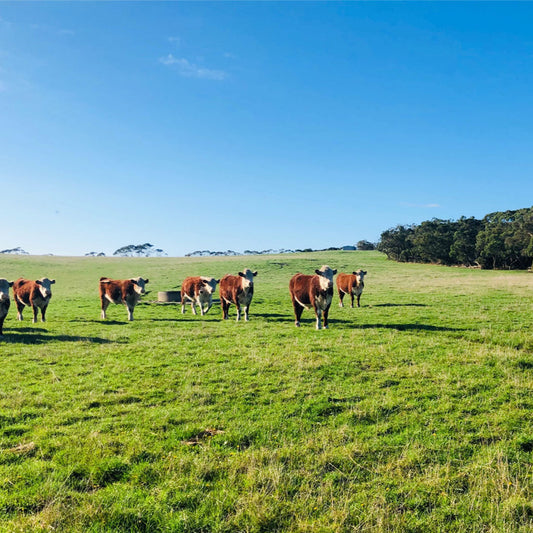
Grass Fed vs. Organic vs. Pasture Raised Beef
When you're trying to eat healthy, there are a lot of options that you'll find. As well as various benefits that go with them. But when it comes to beef, it isn't as simple as it may seem. Most of us know that "grass-fed", "organic", and "pasture-raised" are good buzzwords to look for, but what do they really mean? Well, we're going to dive into each of them to offer direct comparisons. We will help you choose the right option for your healthy diet. We will explain Grass Fed vs. Organic vs. Pasture Raised Beef.
It's important to note that there are distinct differences for each type of beef. Pasture-raised doesn't automatically mean that the beef is organic. While grass-fed typically does mean that the cattle were raised out in the pasture eating grass grown from the ground. Keep that in mind as we continue, and we'll explain why. Here is the difference between Grass Fed vs. Organic vs. Pasture Raised Beef.
Grass Fed v.s. Pasture Raised Beef
First of all, what is grass-fed beef? As the opposite of grain-fed beef, grass-fed means that cattle enjoy a more natural diet of grass, similar to how they would eat out in the wild. They aren't fed grains which means that they don't develop man-made eating patterns that can lead to expedited growth and lower quality meat. In the case of grass-fed beef, cattle are able to grow and develop far more naturally, leading to better quality beef overall. In most cases, grass-fed beef comes from cattle that spend their lives outdoors in a pasture. This is a far less stressful life, and beef obtained from pasture-raised cattle is of a much higher quality as a result. At Pre, we only source beef that comes from pasture-raised, grass-fed cattle because we understand the difference that quality makes.
Grass-fed vs Organic Beef
What's the difference between grass fed and organic beef? Better yet, what is organic beef? There are a lot of regulations around what products can be called organic, and obtaining organic certification is an expensive process. Organic beef doesn't have to come from grass-fed cattle, but it specifically cannot come from cattle that have been raised in overcrowded feedlots for extended periods of time. That's good news, however, the USDA only defines that cattle must have continuous, free access to the outdoors for pasture-raising for the grazing season for the geographical area of the beef is raised.
This is important, because if the cattle are organic and grass-fed, but are located in harsh environments. They are most likely eating dried grasses and under shelter more often than out on pasture. The environment where the cattle are raised is key. Organic beef can't contain any antibiotics, hormones, or GMOs. The cattle can't be raised around any pesticides or fertilizers. Again, that's great, but they can be fed organic corn and grains, which isn't great. Looking at organic beef vs non organic grass-fed beef, the winner isn't as obvious as it may seem just because of using the term organic. Grass-fed, non-organic beef isn't necessarily a bad thing, as grass-fed is a key component to better-for-you beef.
Is Grass Fed Beef Better Than Organic?
In our opinion, natural is best. Grass-fed beef may have been exposed to things that organic beef hasn't been exposed to, but grass-fed, pasture-raised beef is undoubtedly more natural and far better for the cattle. It all comes down to the farmers, too – our farmers in Australia and New Zealand don't use antibiotics unless medically necessary to save a sick animal (which is a rare occurrence) and practice rotational grazing to ensure that their cattle receive the best nutrients available.

Shop Grass-Fed, Pasture-Raised Beef with Pre
At Pre, we believe that education is important. Our goal is to provide you with full transparency into how we source our beef. You have options when it comes to the beef you choose to purchase, and we hope you'll agree that natural is best. Now that you know the difference between Grass Fed vs. Organic vs. Pasture Raised Beef, make smarter decisions when shopping! Shop now to find premium-quality beef products and make smarter decisions about your health.


